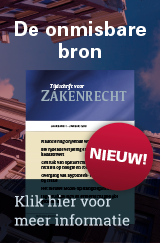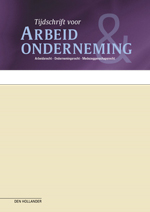Tijdschrift voor Arbeid & Onderneming
Arbeidsrecht – Ondernemingsrecht – Medezeggenschapsrecht 2017 nr. 3
The (possible) impact and consequences of Aslam and others v Uber B.V. and others for the industry in the UK and the Netherlands
M.M. van den Berg LL.M.
Artikel kopen € 79,00 excl. BTW
In plaats van abonneren kunt u dit artikel ook afzonderlijk kopen.
The gig economy has disrupted the traditional employment relationship. In this new world, digital ‘platform companies’ using algorithms and smart technologies are creating agile employment models. These new forms of employment are not limited to the standard contractual framework that sets out the employment terms and corresponding wage; rather they are performed through an online account on platform companies' websites. Uber uses such a business model. No form of employment contract exists for its drivers; work schedules and working hours are absent, and drivers only get paid when they carry customers, and they are responsible for their own pensions and health care. In other words, the risks usually borne by companies are being placed back onto individuals. Uber exclusively focuses on its core business, which consists of connecting the supply of and the demand for taxi services, and disclaims all other types of responsibility or commitment with respect to its drivers. This has resulted in two of its UK drivers successfully claiming that they are workers and therefore entitled to, among other things, national minimum wage and paid holiday. This article analyses the consequences of Aslam and others v Uber B.V. and others in the industry in the UK so far, as well as the possible future impact of this decision for the industry in the Netherlands.
U heeft op dit moment geen toegang tot de volledige inhoud van dit product. U kunt alleen de inleiding en hoofdstukindeling lezen.
Wanneer u volledige toegang wenst tot alle informatie kunt u zich abonneren of inloggen als abonnee.
Verder in dit artikel:
1. Background
2. What is the gig economy business model?
3. Relevant legal framework in the UK
4. Aslam and others v Uber B.V. and others
5. Implications for the industry
6. Relevant legal framework in the Netherlands
6.1. Relevant case law
7. Impact of Aslam and others v Uber B.V. and others in the Netherlands
Bijlage(n)
- Bijlagen zijn alleen beschikbaar voor abonnees.
Artikel informatie
- Type
-
Artikel
- Auteurs
-
M.M. van den Berg LL.M.1
- Auteursvermelding
- Ik ben auteur van dit artikel
- Datum artikel
-
30 oktober 2017
- Uniek Den Hollander publicatienummer
-
UDH:TvAO/14535
Overgang van de ondernemingsovereenkomstOp grond van art. 32 Wet op de Ondernemingsraden (hierna: WOR) kan een onderneming met zijn ondernemingsraad een ondernemingsovereenkomst sluiten. Deze ondernemingsovereenkomst kan in v...
Wnt: tot hier en verder Topinkomens zijn geen rustig bezit. Na de financiële crisis van 2007 ligt het inkomen van veelverdieners onder een vergrootglas, zeker wanneer het om bankiers of om de publieke sector g...


